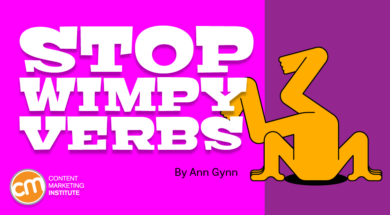You learned a skill in grade school that can set your content apart today.
Verbs can make all the difference in your sentences.
That lesson learned in elementary school will let your content stand out in the proliferation of boring, weak, and ineffective language. By slashing through those wasted, wimpy verbs, your content will pack a bigger punch and better motivate your audience.
Study these four tips and related before-and-after examples to get ideas for peppering powerful verbs into your writing. The “before” excerpts come from paragraphs in writing-advice articles I found online and from my work. (I love irony.)
Slash wasted, wimpy verbs in favor of active verbs that pack a bigger punch in your #content, says @AnnGynn via @CMIContent. #WritingTips Click To Tweet
1. Know the subject for an active verb
Passive verbs work best when the subject of an action is unknown, explains the Guide to Grammar and Writing. Example: “The bicyclist was injured in a hit-and-run accident.” Since the driver (ie, subject) is unknown, this sentence couldn’t work in active voice.
But many writers weaken their sentences by using passive verb forms too often. Passive voice creates rudderless sentences. Active verbs, on the other hand, create visuals, instill emotions, and motivate readers.
Consider this verb transformation example. The passive version: “Jane is a shining example of why you should study hard.” Now the active version: “Jane shines as an example of why you should study hard.”
2. Move verbs into the open
The US government operates a website devoted to writing effectively. Hidden verbs make the don’t-use checklist: “A hidden verb (or nominalization) is a verb converted into a noun. It often needs an extra verb to make sense. For example, ‘Please make an application for a personal loan’ is longer and less clear than ‘Please apply for a personal loan.’”
The Writing Cooperative notes hidden verbs usually end with -tion, -sion, -ment, -ance, and -al. It shares this example:
- Before: We will conduct a demonstration of the process
- Anus: We will demonstrate the process.
Stop using hidden verbs. They often end in -tion, -sion, -ment, -ance, and -al.
3. Minimize connecting
Linking verbs – usually forms of “to be” – connect the subject to the subject or adjective complement (a descriptor of the subject). Think of forms like am, is, are, was, were, be, been, and being. Scribbr notes linking verbs also can encompass the senses, such as taste, sound, smell, feel, and look.
Here’s an example of a linking verb: “The cat is asleep.”
Now, change that linking to an active verb: “The cat sleeps.”
Here’s an example from Syntaxis: “Laquita is being a poor sport.”
But with the linking verbs removed and an action one thrown in: “Laquita lost the game and tossed the chessboard.”
Omitting linking verbs allows writers to better illustrate what happens because they require more explanation.
4. Stop hedging and hesitating
Don’t use unnecessary hedging verbs or phrases. Let me explain.
The Cambridge Dictionary says hedges “soften what we say or write … They make what we say less direct.”
You may need to hedge because you are uncertain of the statement or want to cushion your language to achieve a desired effect from the reader or listener.
People sometimes use “I feel” or “we think” as a prelude to a statement, softening the takeaway. For example, “I feel you should consider increasing your video production because the research shows audiences prefer that format.”
Instead, use direct language: “Increase your video production because research shows audiences prefer that format.”
Revised examples for better verbing
I found many examples of poor verb use in articles that purport to teach writing skills. I wanted to add each one to the corresponding tip above, but I found most of them committed two or more verb sins.
In this one from MasterClass, I eliminate the passive voice and hedging language.
As published: “There are certain elements that every good writing style should have, like simple words, short sentences, and direct language that engages readers. While you want to preserve your unique tone, there are ways to improve your style by being more deliberate in how you arrange your words and craft your story.”
Verb-focused edit: “Every good writing style should engage readers with certain elements like simple words, short sentences, and direct language. To preserve your unique tone and improve your style, be more deliberate in how you arrange your words and craft your story.”
In this example from Grammarly, I get rid of an unnecessary gerund and eliminate the passive voice.
As published: “An effective book analysis is more than sharing your opinion; it’s interacting with the text and demonstrating that you’ve read it critically and formed a well-developed opinion about it.”
Verb-focused edit: “In an effective book analysis, you share more than your opinion. It interacts with the text and demonstrates your critical reading and well-developed opinion about the material.”
In this passage from MasterClass, I switch up the less powerful passive voice and get rid of the hidden verb.
As published: “Short sentences are easier to comprehend, something that readers appreciate. Avoid trying to pack too much into a line.”
Verb-focused edit: “Readers appreciate short sentences because they are easier to comprehend. Avoid packing too much into a line.”
In this CMI article, I originally used passive voice words. See the verb-focused edit for how I could have written it better.
As published: “I’m not as interested in cranberries in January, February, March, etc., so the content isn’t as relevant.”
Verb-focused edit: “Cranberries don’t interest me as much in January, February, March, etc. The content’s relevance also diminishes.”
You can’t unseen poor verb choices once you start looking. See the surprising examples @AnnGynn found in #content that gives advice on writing well via @CMIContent. #WritingTips Click To Tweet
Put verbs into an action plan
Practice verb-focused editing to pack bigger punches into your content.
Try this: On the next three pieces you edit, dedicate one round to checking verbs only. Once you do it a few times, your verb use (writing and editing) will improve. Eventually, you won’t need a separate verb-centered editing round.
Updated from a September 2021 post.
HANDPICKED RELATED CONTENT:
Cover image by Joseph Kalinowski/Content Marketing Institute
.
Follow us on Facebook | Twitter | YouTube
WPAP (697)


